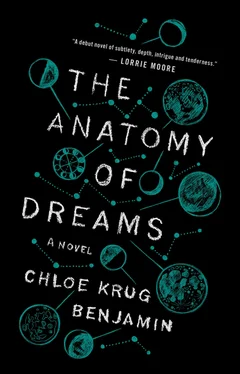It was true—there was nothing very exciting about answering phones at the sleep clinic. So why did I feel betrayed?
“Thom told me that Janna came by a few days ago,” I said. “He said she wanted to be a participant in one of our experiments.”
Gabe blinked.
“Right,” he said. “It was over the weekend. You had gone to the bank, I think. Janna knocked on the door. We sat on the porch. We made small talk for a few minutes, mostly about gardening, and then she asked what she would have to do to qualify for one of our studies.”
“But why? Why would she even want to qualify?”
“I think she liked the concept. Said she’s been keeping a dream journal since her teens—one of those types.” Gabe grinned easily. “She wanted to talk about this recurring dream where her teeth fall out. She said sometimes they rot or grow in crooked, and other times they fall out one by one with a light tap.”
He took his index finger and tapped his two front teeth in demonstration.
“Did you give her Freud’s interpretation?” I asked.
“What?” asked Gabe, amused. “That the loss of teeth is a symbol of castration? A punishment for masturbation? No, Sylve, I didn’t tell her that.”
“Regardless,” I said, “we couldn’t use her. We know her. It wouldn’t be ethical.”
“But what’s more ethical than helping the people you know? Why should the process be so quarantined, so sterilized? I mean, science should be applicable to real life—so why should we divorce it from love?”
I stared at him. He washed his plate and dried it, then shook his hands of water. Little droplets sprayed my chest.
“Love?”
“Oh, come on,” he said. “I meant on principle.”
So Janna wanted to do exactly what Thom had warned against—to answer her questions, to crawl down her own rabbit hole. Thom believed it was wrong, and yet he hadn’t tried to dissuade her. Did he respect her freedom to do as she chose, or didn’t he care? Perhaps it was that he didn’t think our research would work, dangerous as it was in theory. I thought about our patients. Was it true that their dreams felt more real than anything tangible, whether or not they were lucid? That the people they dreamed of—partners, children, even people they’d created—were more vivid to them than those who were alive?
But I quickly shook off the idea. If these dream characters were more vivid to our patients, it was because they were disturbed. That was why they’d come to us. And it was exactly why I was so angry that Janna had gone to Gabe. She didn’t have a sleep disorder. She only wanted attention, and it seemed she wanted it from him.
• • •
That evening, Gabe left to work in the university library. He wasn’t home by dinner, so I made cream of mushroom soup from the can and ate while I worked in the office. But soon I became restless, and I climbed the stairs to the attic.
I hadn’t been there since we first moved in. It was a small, slanted space, the floors splintered and covered in a soft down of dust. There was one window, cracked open; each draft shook the pane. We’d thrown our boxes up here haphazardly in August, glad to be done with them, and they covered most of the floor. An extra pair of eclipse curtains was crumpled darkly in one corner. Foam peanuts were strewn across the ground, shining like plastic snow. My canvases leaned against the back wall, and my paint boxes were piled beneath an old exercise ball.
Maybe I was only looking for something to do with my hands, but I started to clean. Before long, I sank into a state that felt as close as I’d ever come to meditation. I began by nesting the smaller boxes inside each other and stacking them in towers. With the ground partially cleared, the room doubled in size. I mopped the floors and wiped the molding, cobwebs tangling around my hands like hair. I found an area rug in one of Gabe’s boxes and set it in front of the window. I took a brass standing lamp from the living room—we never used it—and put it next to the rug. I collected the foam and bubble wrap in a trash bag. Then I brought a rag up from the kitchen and scrubbed the windowpane until it gleamed.
As dusk fell, I leaned against the window frame. I could see the fence that separated our yard from Thomas and Janna’s. The maple trees, scarlet with fall, quivered like flame. A rabbit scampered over our porch and disappeared under the fence. I had not felt so peaceful, so hidden, in years.
Before I left, I tidied my paint supplies. It pleased me to see the canvases in neat rows, the paints organized and boxed by color. Ringing with accomplishment, I returned to the office, where I worked more efficiently than I had in months.
9. MARTHA’S VINEYARD, MASSACHUSETTS, 2002
In June of 2002, I boarded a plane in San Francisco bound for Martha’s Vineyard. This was where Keller had a research and training compound, and it was where Gabe and I would spend the summer so I could be brought up to speed before we left for Fort Bragg that fall. I had yet to learn about Keller’s simultaneous potentialities theory of the subconscious mind, but Gabe told me it was mainstream enough to have earned him a tenured professorship at the University of San Francisco in the mideighties. Its fringier elements, though, had also attracted a cultish following of experimental academics, conspiracy theorists, and members of the artistic and political avant-garde.
While at USF, Keller founded an interdisciplinary philosophy-neuroscience-psychology program, commonly known as PNP. But in 1995, he left to become the headmaster at our small, private boarding school, hidden in the fog and black walnut trees and upside-down rivers of Humboldt County, California. While at Mills, I’d known that Keller was a psychologist with some degree of prestige, but I hadn’t bothered to learn more than that. Gabe shared the rest of this with me in the weeks before we left Berkeley. When David wasn’t home, he helped me pack and mail boxes. During work breaks, we spread out on the empty floor and ate pizza out of the delivery box as he told me about Keller. Gabe soon gave up trying to teach me about simultaneous potentialities, but it wasn’t only the theory that confused me.
“So Keller was fully set up at USF,” I said. “A tenured professor, the founder of this groundbreaking lucidity program, and he left to head up a high school? It doesn’t make any sense. It’s like he was regressing.”
By now, we were on the plane from SFO, sitting in the seats Keller had purchased for us. These were the days when planes still served meals—something we dreaded at the time but later came to regard as a bygone luxury. We prodded the lemon chicken breast, set deep in a gelatinous yellow glaze. We unwrapped our twin bread rolls from aluminum foil and were surprised to find them still warm.
“It’s strange, I know,” said Gabe. He speared a piece of chicken with his plastic spork and swallowed it, making a face. “Almost like he needed a vacation. All I know is that he came to Mills in ’95, just like us, and stayed for five years. Then he moved to Fort Bragg to do his own research.”
“And you don’t know why?”
Gabe shrugged. “There are some things I can ask him and some things I can’t. My guess is that he started off within the university system because he had to, and over time he wanted more freedom. I know he’s still connected to the university in a tangential way—he’s sort of a grandfather to the PNP program—but other than that, they seem to leave him alone.”
Keller spent each summer on Martha’s Vineyard. The house was an inheritance, though Gabe didn’t know from whom. All he knew about Keller’s family was that his mother was a German immigrant while his father, a New York Jew with Eastern European roots, sold hats. Neither one seemed to have been particularly well-off, so I couldn’t shake the sense that the house had been given to Keller by a third party.
Читать дальше












